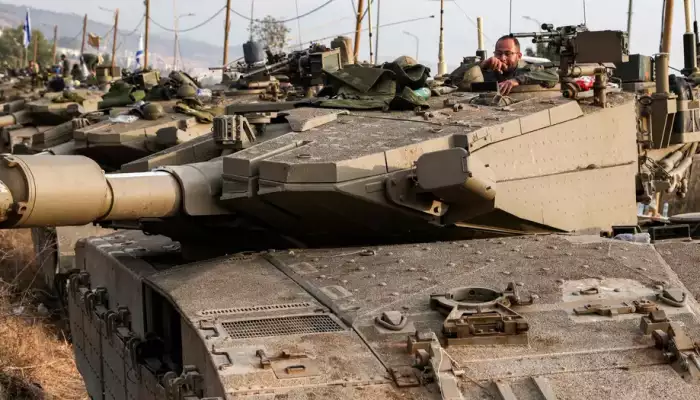
Highways leading from southern Lebanon to the capital, Beirut, were jammed with cars even before fighting between Israel's military forces and the Iran-backed Islamist militant organization Hezbollah flared near the Lebanese-Israeli border on Wednesday.
"Thousands of people from the south have left the area out of fear," Lynn Zovighian, managing director of The Zovighian Partnership, a family-owned social investment platform in Beirut, told DW on Tuesday.
"On our way to Beirut, we were surprised by the number of cars heading there," Mariam Hoteit, a housewife and mother of five from the town of Shakra, which is only 7 kilometers (4 miles) from the border with Israel, told DW.
"Watching the queues of cars in front of petrol stations reminded me of the scenes during the gasoline shortage crisis of last year," Hoteit said.
Lebanon has been mired in a series of crises that have led to a complete breakdown of its economy, inflation of up to 250% and a caretaker government without a president. According to the NGO Human Rights Watch (HRW), nearly 80% of Lebanon's population lives below the poverty line.
Hezbollah is split into political and military arms, the latter of which has been designated as a terror group by the European Union, France, Kosovo and other governments. The entire Hezbollah has been designated a terror organization by the United States, Germany, Israel and several other governments.
The group is deeply intertwined in Lebanese politics and public life. Hezbollah holds 12% of parliamentary seats in Lebanon and, even after falling out of government following the 2022 election, maintains close ties with the ruling parties. It finances hospitals and runs its own banks with access to US dollars.
Given the group's political and military significance in Lebanon, it is fair to say that its leadership is closely watching as events unfold in Israel and Gaza after Hamas — also an Iran-backed organization that has been designated a terror group by the EU, the US, Germany and other governments — carried out a large-scale attack on Israel on Saturday.
On Sunday, Hezbollah launched a small-scale cross-border attack on the uninhabited Shebaa Farms — sovereignty over which is disputed by Lebanon and Israel.
"This was their way to signal that they are present without triggering immediate retaliation from Israel," Heiko Wimmen, Lebanon project director at the nongovernmental conflict prevention organization International Crisis Group, told DW.
"They clearly show that they are able to strike if they want to," Wimmen said.
"Hezbollah's position is clear for the moment," Wimmen added. "They are not interested in directly engaging in this conflict, as long as there is no attack from the Israeli side, or what could be perceived as crossing a red line."
Wimmen said such a red line could be forcing a large number of Gazans into Egypt or the complete destruction of Hamas.
Kelly Petillo, Lebanon researcher at the European Council on Foreign Relations, told DW that "a red line for Hezbollah might be if the levels of [Israeli] violence in Gaza become too intense with whatever their definition of intense may be."
"But, so far, I think we are still in the limits of a contained engagement and no breach of red lines," she said, evaluating the salvo of rockets that Hezbollah fired toward Israel on Tuesday, the responding artillery fire by the Israel Defense Forces, or IDF, and the rising tensions on the Israel-Syria border.
"Both sides retaliate proportionally to the other's attack, so it appears that both continue to avoid escalation," Wimmen said.
An escalation with Hezbollah could call the group's allies Iran, Russia and Syria to action, which could catapult the whole region into conflict. The US has already sent warships to the region in a show of support for ally Israel.
"If the little brother Hamas is able to perform such an attack, the Israelis might have to consider what the big brother Hezbollah is able to do," Wimmen said.
For example, Wimmen said, Hamas fired up to 5,000 rockets on Israel over the weekend, but Hezbollah "already had an arsenal of at least 150,000 missiles five years ago, so who knows how many they have now?"
In particular, the number of precision-strike missiles in Hezbollah's arsenal is unknown. These missiles are able to change trajectory shortly before impacting their target. "Neither the defense system nor anyone else can tell which missiles that are fired in one barrage are precision strike missiles and which ones are conventional," Wimmen said.
Nathan Brown, a professor of political science and international affairs at George Washington University in the United States, and a current fellow at the Hamburg Institute for Advanced Study in Germany, told DW that "Israel will not initiate hostilities, but, if Hezbollah does, Israel might respond very forcefully, believing it necessary for deterrent purposes, so there is a possibility of escalation."